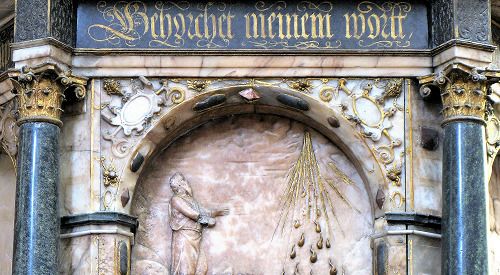
CFP: Fifteenth Annual REFORC Conference on Early Modern Christianity
REFORC has opened the call for papers for the Fifteenth Annual REFORC Conference on Early Modern Christianity, hosted by the University of Wrocław from 19-21 May 2026.
At the time of the Reformation, new ways of perceiving bodiliness and materiality began to reshape Western thought, particularly in relation to the understanding of the Incarnation and the Eucharist. In a sharp critique of medieval Aristotelianism, especially the doctrine of transubstantiation grounded in Aristotelian hylomorphic theory, the Reformers developed new understandings of Christ’s presence, the Holy Spirit, human being, and the material world. While these reinterpretations varied among the different reformers, they commonly marked a departure from medieval theological frameworks and opened the door to (re)configurations in how materiality was understood, experienced, and practiced. The reconfigured understanding of the sacraments had a substantial influence on liturgy and, consequently, also on ecclesiastical art, architecture, and music. Likewise, the role of materiality in everyday domestic piety was reassessed, reflecting broader theological reconsiderations of how the sacred could be mediated through physical forms.
The organizers of the conference invite papers and panel proposals on the topic of Early Modern Christian materiality which may include, but are not limited to following questions:
How was matter understood in Christian thought during the early modern period, particularly in relation to the Incarnation and the Eucharist?
How did attitudes toward materiality change or diverge across Christian denominations?
To what extent was the material world perceived as a book of wisdom? What role did materiality play in theological cognition—in sermons, literature, visual arts—and across confessions?
What were the theological foundations and practical expressions of materiality in liturgical life across denominations? How did theological, social, and cultural factors shape liturgical material practices?
How did materiality shape everyday religious practice and confessional identity—in church, domestic, and public spaces?
In what ways did materiality serve as an argument in interconfessional polemics? How were objects understood as agents, bearers of theological meaning, or potential threats (e.g., in iconoclasm)?
What was the impact of theological debates on the material aspects of ecclesiastical architecture and furnishings? How did theology influence the perception and design of sacred space?
How was the materiality of a church community (its human and spiritual body) negotiated in relation to the materiality of the church building itself?
How did changes in the natural and built environment reflect or influence religious and liturgical thinking? Are there ecological dimensions to early modern theology and practice?
How can materiality serve as a heuristic tool to foreground marginalized voices and topics, such as gendered practices, vernacular religion, or attitudes toward the environment?
Call for Papers and Registration
The call for papers is open. Short paper proposals can be submitted until February 15, 2026, while registering via the registration form. The scientific committee will inform you on the acceptance of your paper within ca. two weeks of receipt of your proposal.
